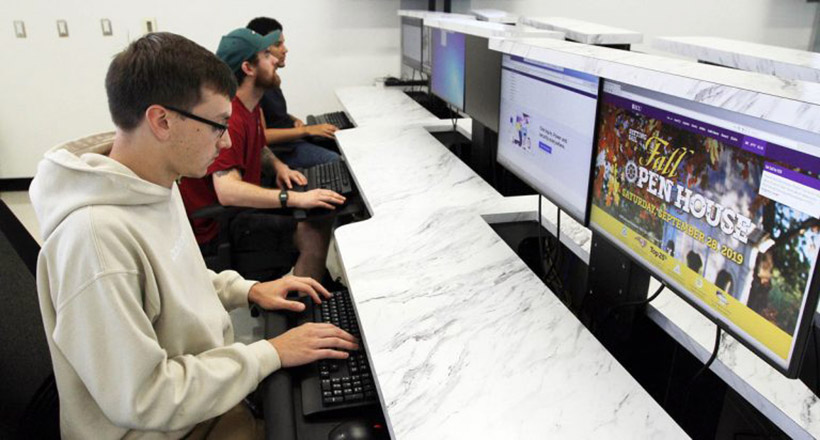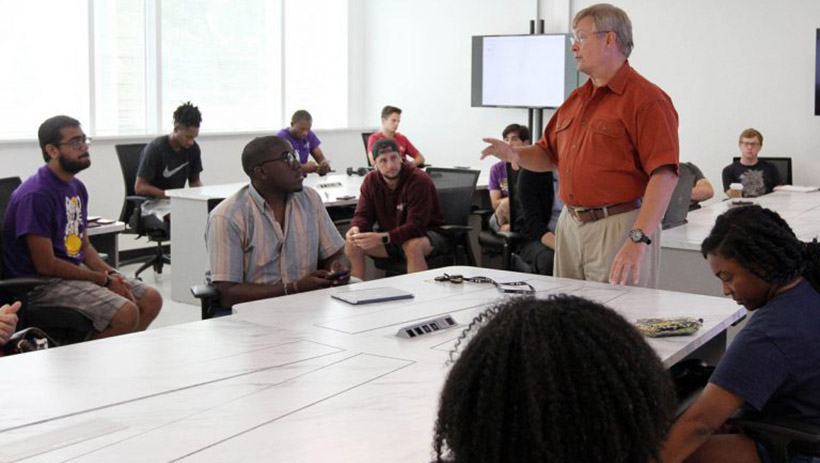Publisher's note: The author of this post, Ken Buday, is a contributor to ECU News Services.
It's not just what you see in the new cybersecurity lab in the Science and Technology Building at East Carolina University. It's also what you don't see.
The Department of Technology Systems has created a computer lab where no wires, cables or power cords hang from the ceiling or seemingly appear and disappear into the walls or floor. Cameras, microphones and speakers that allow for online learning blend into the ceiling and walls. Individual computer screens emerge from below the four, large group-learning tables, and larger presentation screens and a 16-by-7-foot wall screen at the front of the classroom allow for interactive presentations and learning.
From left, Alex Dosch, a senior from Charlotte, Nicholas Hempenius, a second-year graduate student from Jacksonville, and Artemas Brown, a junior from Charlotte, get logged in at the new cybersecurity lab. | Photos: Ken Buday
"The design from day one was to reduce the computing footprint without reducing the ability of students to interact with the various virtualized storage and processing capacity that we have here in the college," said Dr. Charles Lesko, associate professor and director of graduate studies in the department.
"In a typical computer classroom, you have all the processing there, but more and more we're learning we don't need all that stuff in the classroom. It makes noise, it makes the room hot, it's distracting and it's not secure. We were able to keep the resources centralized in other supporting facilities in the college. That's important because now you don't have a lot of the distraction that you have in other classrooms, and plus it's not as cramped, so the students can focus on the information process."
The classroom is in use for the first time this semester. Students can work individually or in teams, with the four presentation monitors allowing them to view what's going on without cramming together around a small monitor.
"We're an intelligence agency now. It's awesome," Charly Tanner, a senior who is a part of a cybersecurity club, said about the lab.
"It's clean. It's a very well-thought-out setup. I'm excited to see us have some competitions here."
The lab supports about 150 graduate and undergraduate students seeking degrees in information and computer technology with concentrations in cybersecurity, a program that has been certified as a National Security Agency National Center of Academic Excellence.
"This has been something that has been really needed here at the university - a focused space for training our future cybersecurity professionals," Lesko said.
"The need for improved cybersecurity is pervasive across our society, and we need to continually look to develop our ability to effectively train our future cybersecurity professionals."
Lesko called protection of information crucial for individuals, businesses and industry.
"Anything that is connected via the Internet is susceptible," Lesko said.
That makes the lab vitally important.
"How much is there a need for cybersecurity specialists in our society? It's growing," Lesko said.
"We don't have enough candidates in the pipeline to support it, much less to get them in training, so when we do get the opportunity to train them and train the trainers, we need to have spaces that are well-thought-out to maximize the information resources that we do have."
The planning for the lab started four years ago. The bulk of the funding came from two National Security Agency grants totaling about $225,000. Student fees, and departmental and university funds also contributed.
Dr. Charles Lesko instructs students in the new cybersecurity lab.
Once funding was secured, Room 242 was taken out of service for a year to allow for the renovation and installation of new wiring and cables, the monitors and wall screen, and a mentor station from which the room is monitored and controlled. There's also a screen outside the classroom in the hall.
"As you can imagine, something that has that much technology requires a lot of infrastructure upgrades," said Chad Spruill, director of laboratory operations for the College of Engineering and Technology.
"We worked with the university project managers to get contractors in to upgrade the power in the room, the lighting, and especially to get enough networking cable pulled through the walls. It's pretty complicated. There are some novel things that we are doing in that room that really haven't been done before."
Lesko said the versatile lab is unique in that it allows for different types of learning and uses.
"We wanted to make sure that it would support individual learning, team and research groups as well as online and hands-on experiences, and blended learning and video conferencing," Lesko said.
"During times when that space is not being used as a classroom, it's a space where the cybersecurity students can go to link up with others. It becomes a community hub for them, and we hope that it will also serve our capstone teams, who can book times in there for their team meetings and projects. We have some tentative workshops for high school and community college cybersecurity faculty to come in and use that space. We can have what are non-curricular activities like work group meetings, competitions, workshops and workforce development."
Spruill said the opening of the lab this semester would not have been possible without the support of the IT staff of the college.
"Our tech team has put a lot of hard work into this project," he said.
"They will also be supporting the day-to-day operation. They deserve a lot of credit."
Lesko said he's happy to see the lab in operation.
"I'm excited for the program. I'm excited for the students," he said.
"It's something that's really needed."


